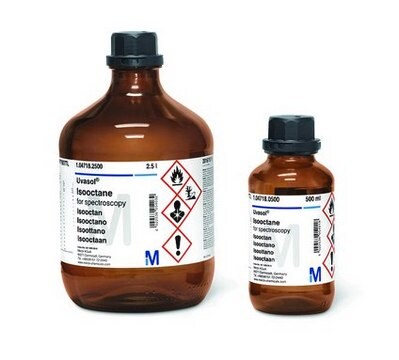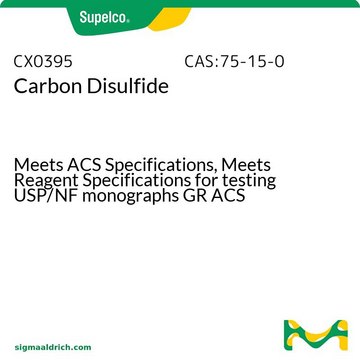About This Item
Recommended Products
grade
ACS reagent
Quality Level
vapor density
2.67 (vs air)
vapor pressure
5.83 psi
assay
≥99.9%
form
liquid
autoignition temp.
212 °F
expl. lim.
50 %
impurities
H2S, passes test (lim. ~1.5 ppm)
SO2, passes test (lim ~2.5 ppm)
≤0.05% water
evapn. residue
≤0.002%
color
APHA: ≤10
refractive index
n20/D 1.627 (lit.)
bp
46 °C (lit.)
mp
−112-−111 °C (lit.)
density
1.266 g/mL at 25 °C (lit.)
SMILES string
S=C=S
InChI
1S/CS2/c2-1-3
InChI key
QGJOPFRUJISHPQ-UHFFFAOYSA-N
Looking for similar products? Visit Product Comparison Guide
Related Categories
General description
Application
It may be used in the preparation of dibenzyl trithiocarbonate, a RAFT (Reversible Addition-Fragmentation Transfer) chain-transfer agent (CTA). It may be employed as a solvent in the preparation of benzyl chlorodithioformate.
Packaging
Related product
signalword
Danger
Hazard Classifications
Acute Tox. 4 Inhalation - Eye Irrit. 2 - Flam. Liq. 2 - Repr. 2 - Skin Irrit. 2 - STOT RE 1
target_organs
Peripheral nervous system,Central nervous system,Cardio-vascular system,Eyes
Storage Class
3 - Flammable liquids
wgk_germany
WGK 2
flash_point_f
-22.0 °F - closed cup
flash_point_c
-30 °C - closed cup
Choose from one of the most recent versions:
Already Own This Product?
Find documentation for the products that you have recently purchased in the Document Library.
Customers Also Viewed
Our team of scientists has experience in all areas of research including Life Science, Material Science, Chemical Synthesis, Chromatography, Analytical and many others.
Contact Technical Service







